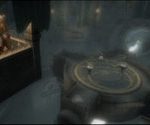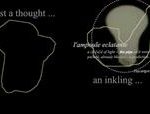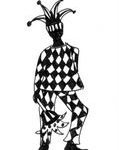2008
Jason Rhody argues that Prince of Persia: The Sands of Time attains the status of a game fiction by leveraging "narrative tragedy" to enhance "ludic complexity" - creating a game in which narrative and play, far from being opposed, as in most assessments, enhance one another.
Editors Pat Harrigan and Noah Wardrip-Fruin introduce the essays of the "Computational Fictions" section of Second Person, focusing on the conversion of human ludic interaction into computational processes - a necessary condition for computer games.
Mark Marino explains Twelve Easy Lessons to Better Time Travel as an allegory of electronic writing, featuring characters that represent salient figures from Alan Turing to Shelley Jackson.
Marie-Laure Ryan describes Juvenate as an audiovisual hypertext that can be navigated via a provided map or wandered through like a maze, evoking the question of whether the text is best understood as a narrative or a game.
Tim Peterson brilliantly lays out for us how Charles Bernstein's Girly Man represents the mobilization of queer rhetoric, iconoclastic values, and an implied notion of the family in the figure of the Girly Man.
Anthony Enns questions Kathleen Fitzpatrick's link between an anxiety about the displacement of male privilige and the fear of new media technology in postmodern fiction.
Scott Hermanson presents a dialogue he conducted with novelists Richard Powers and Tom LeClair, at the University of Cincinnati in 2005. Moderated by Hermanson, the novelists discuss the intricacies of writing about nature, the role of history in the novel, and their fictions' use of imitative form.
Stephen Burn considers Tom LeClair's recent novel through the lens of the latter's own critical work on postmodern fiction, while also excavating the novel's relation to Faulkner's tale of racial empire building, Absalom, Absalom!
In "Nothing Lasts," Stephen Schryer considers Tom LeClair's Passing On and The Liquidators as paired novels, one immersing the reader in the maelstrom of the social and economic systems that shape contemporary life, the other shielding the reader from those systems. Unlike the massive novels from the seventies that fascinated LeClair the critic, Schryer finds the novelist a "literary miniaturist," seeking "concise synecdoches for the larger systems" his books evoke.
Emily Short explains that one of the goals of Savoir-Faire is to teach the player to become a magician. This pedagogical orientation means that - in contrast to interactive fictions that allow only a severely limited range of player input - Short's game rewards undirected play because the player is not only solving puzzles, but also learning.
Lev Manovich describes a filmic methodology for the information age: narratives structured on the logic of databases. The delegation of a large part of the editing Mission to Earth to a computer results in a product that is "between narrative and a search engine."
Talan Memmott describes The Brotherhood of Bent Billiard as "a narrative hack of Magritte's symbolic calculus"; it allows the reader to negotiate a number of clickable Magritte-inspired screens, which provide the reader a forum for thinking through the questions of representation immanent in the painter's work.
Steve Meretzky reflects on one of the earliest (1982) NPCs (non-player characters) to evoke an emotional investment from videogame players. Meretzky draws attention to the fact that character development - integral to fiction and film - is not often emphasized in game design.
Helen Thorington describes Solitaire, a program for generating fiction in the same line as the projects explained by Chris Crawford and D. Fox Harrell elsewhere in this thread.
Stuart Moulthrop argues that Pax answers John Cayley's question, "What would textual instruments look like?" Moulthrop maintains that one plays this electronic text (in the manner of a musical instrument) as much as one reads it.
Nick Montfort argues that the contentious notion of the "player character" usefully constrains and makes possible the player's interaction with the gameworld. He considers the possibility that in interactive fiction one plays the character (like an actor plays a role) rather than playing the game.
Jeremy Douglass evaluates Shade within the history of interactive fiction, and considers how light is represented in the code structure of scene descriptions, arguing that "[w]ithout vision there is no agency."
Carl McKinney argues that Jeremy Douglass's analysis of Shade suggests a presence/absence dynamic useful for understanding interactive fiction in general.
Mark Keavney describes his process in composing a story in which the readers voted on plot points as he was writing, resulting in a truly interactive fiction - a narrative in which, as Keavney puts it, "[n]either the players nor I owned the story completely."
Jeff Tidball contends that the Second Person collection makes too much of the narrative vs. play debate, and pays attention to the mechanics of narrative and play over their affective capabilities.









